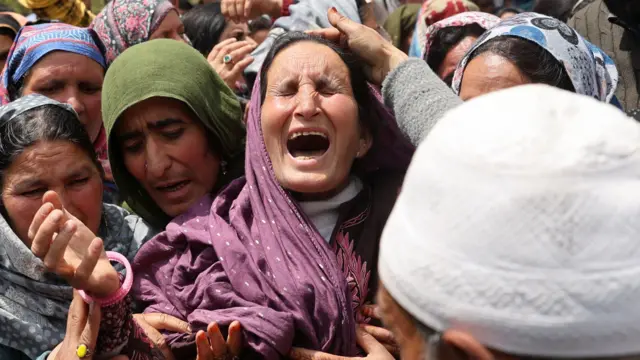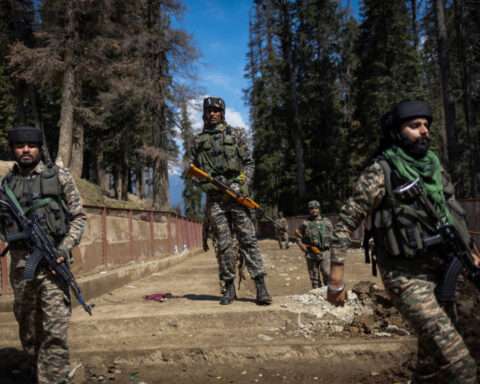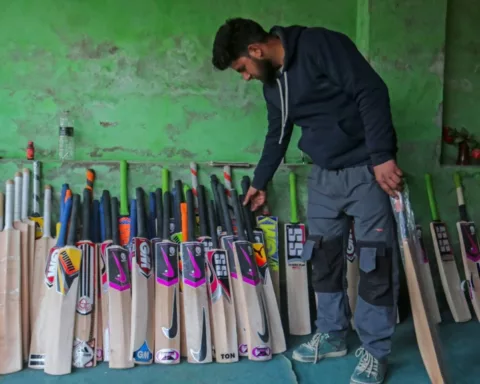A horrific massacre of 26 tourists in Indian-administered Kashmir has plunged India and Pakistan into a dangerous new confrontation, escalating tensions between the nuclear-armed neighbors to levels not seen in years.
The attack, carried out by gunmen in the scenic Baisaran Valley near Pahalgam, has shattered the region’s fragile calm, prompting India to unleash a barrage of punitive measures against Pakistan, including suspending a vital water-sharing treaty and closing a key border crossing. As both nations trade accusations and brace for potential retaliation, the world watches anxiously, fearing a spiral into military conflict in one of the globe’s most volatile regions.
On April 24, 2025, the attack sent shockwaves through India and beyond, marking the deadliest assault on civilians in Kashmir in nearly two decades.
The victims, including 25 Indian citizens and one Nepali national, were gunned down in a meadow accessible only by foot or horseback, a place known for its breathtaking beauty. India swiftly pointed the finger at Pakistan, alleging support for the militant group The Resistance Front, which claimed responsibility.
Pakistan has denied involvement, but the fallout—diplomatic expulsions, border closures, and fiery rhetoric—has pushed the two nations to the brink, raising alarms about the potential for broader conflict.
Kashmir ’s Tragedy : A Brutal Attack Shatters Kashmir’s Peace
The assault unfolded on Tuesday, April 22, in the Baisaran Valley, a pristine meadow in the Anantnag district of Jammu and Kashmir, often dubbed a “mini Switzerland” for its idyllic landscapes. Gunmen, emerging from dense forests, opened fire on a group of tourists with automatic weapons, killing 26 and injuring at least 17. Eyewitnesses described scenes of unimaginable horror, with some survivors recounting how the attackers singled out men or accused victims of supporting Indian Prime Minister Narendra Modi before shooting. The attack, rare for targeting tourists, has upended Kashmir’s burgeoning tourism industry, which saw 3.5 million visitors in 2024.
Indian authorities have labeled it a “terror attack,” with police suspecting four gunmen, including two Pakistani nationals, were involved. A manhunt is underway, with 1,500 people detained for questioning and a reward of 2 million rupees ($23,000) offered for information on the attackers. The Resistance Front, believed to be an offshoot of the Pakistan-based Lashkar-e-Taiba, claimed responsibility, citing India’s issuance of residency permits to non-Kashmiris as a motive, which they claim fuels “demographic change” in the region.
A Tourist Massacre Escalates Tensions
India’s response was swift and severe. On Wednesday, New Delhi announced a raft of measures targeting Pakistan: suspending the 1960 Indus Waters Treaty, closing the Wagah-Attari border crossing, expelling Pakistani military advisers, and restricting visas. The Indus treaty, which governs the sharing of a river system critical to Pakistan’s agriculture and hydropower, had withstood decades of conflict, making its suspension a dramatic escalation. Pakistan’s Minister of Power, Awais Leghari, called the move “an act of warfare,” while analysts warned it could violate international obligations and heighten regional instability.
Prime Minister Modi, cutting short a trip to Saudi Arabia, vowed to pursue the attackers “to the ends of the earth.” In a speech in Bihar, he declared, “India’s spirit will never be broken by terrorism,” signaling a hardline stance. Defense Minister Rajnath Singh hinted at further retaliation, while Home Minister Amit Shah, who rushed to Srinagar, promised the “harshest consequences.” Pakistan, meanwhile, convened its National Security Committee to formulate a response, with Prime Minister Shehbaz Sharif facing pressure to counter India’s actions.
A Region Steeped in Conflict
Kashmir’s Tragedy – Kashmir, a Himalayan region claimed by both India and Pakistan, has been a flashpoint since the 1947 partition of British India. Divided by the Line of Control, it has sparked three wars and countless skirmishes between the two nations. The Indian-administered portion, home to a Muslim-majority population, has seen a decades-long insurgency against New Delhi’s rule, with many Kashmiris supporting either independence or unification with Pakistan. India accuses Pakistan of sponsoring terrorism, a charge Islamabad denies, framing the conflict as a legitimate struggle for self-determination.
Tensions have surged since 2019, when Modi’s government revoked Kashmir’s semi-autonomous status, imposing direct control and sparking unrest. While India claims militancy has declined amid a heavy military presence, attacks persist, often accompanied by media censorship and communication blackouts. The Pahalgam massacre, targeting tourists—a group largely spared in the conflict—has shattered India’s narrative of normalcy, especially as it coincided with a visit by U.S. Vice President JD Vance, who condemned the attack as a “devastating terrorist act.”
Global Condemnation and Local Grief
The international community has rallied in condemnation. U.S. President Donald Trump expressed solidarity with India, while Russian President Vladimir Putin and European Commission President Ursula von der Leyen called the attack “vile” and “brutal.” Iran and Israel also issued statements denouncing the violence. Locally, Kashmiris are reeling. Families across India mourned as bodies were transported to their home states, with funerals drawing large crowds. A tour guide, Shah, died heroically trying to stop an attacker, leaving behind a grieving family.
In Kashmir, outrage has fueled protests, with residents chanting “stop terrorism” and demanding accountability. The attack threatens the region’s tourism-dependent economy, which locals like Akib Chaya, a hotel owner, described as a lifeline. “Tourists have never been touched in decades,” he told the BBC, calling the attack a betrayal of Kashmir’s ethos of hospitality. Yet some fear India’s response could exacerbate tensions, with political commentator Saba Naqvi urging restraint to avoid destabilizing the region further.
A Precarious Path Forward
India’s punitive measures have raised the stakes. The suspension of the Indus Waters Treaty, in particular, is a high-risk move. The river system, originating in Tibet and flowing through Indian-controlled Kashmir to Pakistan, is vital for both nations. Experts like Fahd Humayun of Tufts University warn that the suspension could be seen as “belligerent,” risking Pakistan’s national security and inviting retaliation. Pakistan’s Foreign Minister Ishaq Dar has signaled a measured response, but domestic pressure may force a stronger stance.
Analysts fear a military escalation. A 2019 attack in Kashmir led to Indian airstrikes in Pakistan, and the current crisis could follow a similar trajectory. Humayun noted that without “strategic restraint or third-party intervention,” the risk of “uncontrolled escalation” is significant. Security analyst C. Uday Bhaskar suggested the attack aims to draw global attention to Kashmir’s unrest, a goal it has achieved with headlines worldwide. Yet the human cost—26 lives lost, including a honeymooning groom and a businessman on holiday—underscores the tragedy’s toll.
The Weight of History
The Pahalgam attack is not an isolated incident but part of a grim pattern. In 2000, 35 Sikh villagers were massacred in Kashmir during a U.S. presidential visit, and in 2019, a suicide bombing killed 46 Indian soldiers, prompting cross-border strikes. The Resistance Front’s claim of responsibility, though unverified, aligns with its history of targeting Indian interests. Indian officials suspect ties to Lashkar-e-Taiba, a group blamed for the 2008 Mumbai attacks. The group’s social media statement condemned India’s policies, but its actions have drawn widespread condemnation, even from Kashmiri resistance leaders like Mirwaiz Umar Farooq, who called the attack “cowardly.”
As India weighs its next steps, the international community calls for de-escalation. The United Nations has yet to comment, but past interventions in India-Pakistan crises have had limited success. For now, Kashmir remains a tinderbox, with security tightened, schools and businesses shuttered, and a region bracing for what comes next. The massacre has not only claimed lives but also reignited a conflict that threatens to engulf South Asia in chaos.
Focus keywords: Kashmir massacre, India-Pakistan tensions, Pahalgam attack, tourist massacre 2025, Indus Waters Treaty, Kashmir conflict, Narendra Modi






